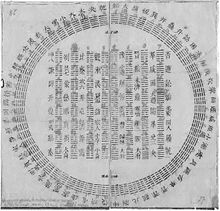I Ching
libro oracular chino
El I Ching es un antiguo texto de adivinación.[1]

Citas
editarNOTA: Salvo en los casos que cuentan con referencia en español, la traducción de las citas incluidas en esta sección es propia del usuario que las aporta.
- «Durante todo el día, el hombre superior es creativamente activo».
- Citada en inglés: «All day long the superior man is creatively active».[2]
- Nota: Hexagrama 1, línea 3
- «No soy yo quien busca al joven tonto;
el joven tonto me busca».- Inglés: «It is not I who seek the young fool;
The young fool seeks me».[3] - Nota: Hexagrama 4, Juicio.
- Inglés: «It is not I who seek the young fool;
- «Nutrirse de la antigua virtud induce a la perseverancia».
- Inglés: «To nourish oneself on ancient virtue induces perseverance».[4]
- Nota: Hexagrama 6, línea 3. Perseverancia.
- «Un ejército debe avanzar en formación correcta.
Si la formación no es buena, la desgracia amenaza».- Inglés: «An army must set forth in proper order.
If the order is not good, misfortune threatens».[5] - Nota: Hexagrama 7, el ejército.
- Inglés: «An army must set forth in proper order.
- «El hombre superior recurre a su valor interior
para escapar de las dificultades.
Él no se permite ser honrado con los ingresos».- Inglés: «The superior man falls back upon his inner worth
In order to escape the difficulties.
He does not permit himself to be honored with revenue».[sin fuentes] - Nota: Hexagrama 12, el estancamiento.
- Inglés: «The superior man falls back upon his inner worth
- «Aquel cuya verdad es accesible, pero digna,
tiene buena fortuna».- Inglés: «He whose truth is accessible, yet dignified,
Has good fortune».[6] - Nota: Hexagrama 14,línea 5; posesión en gran medida.
- Inglés: «He whose truth is accessible, yet dignified,
Referencias
editar- ↑ Kern, Martin (2010). "Early Chinese literature, Beginnings through Western Han". EN: Owen, Stephen. The Cambridge History of Chinese Literature, Volume 1: To 1375. Cambridge: Cambridge University Press. pp. 1–115; p. 17. ISBN 978-0-521-11677-0.
- ↑ Hacker, Edward A. The I Ching Handbook: A Practical Guide to Personal and Logical Perspectives from the Ancient Chinese Book of Changes, p. 352. Paradigm Publications, 1993. ISBN 9780912111360.
- ↑ Hacker, Edward A. The I Ching Handbook: A Practical Guide to Personal and Logical Perspectives from the Ancient Chinese Book of Changes, p. 363. Paradigm Publications, 1993. ISBN 9780912111360.
- ↑ Hacker, Edward A. The I Ching Handbook: A Practical Guide to Personal and Logical Perspectives from the Ancient Chinese Book of Changes, p. 147. Paradigm Publications, 1993. ISBN 9780912111360.
- ↑ Wilhel, Hellmut (traducido por Cary F. Bayne). The I Ching or Book of Change. Princeton University Press, 201. ISBN 978140083708.
- ↑ Hacker, Edward A. The I Ching Handbook: A Practical Guide to Personal and Logical Perspectives from the Ancient Chinese Book of Changes, p. 357. Paradigm Publications, 1993. ISBN 9780912111360.
- ↑ Hacker, Edward A. The I Ching Handbook: A Practical Guide to Personal and Logical Perspectives from the Ancient Chinese Book of Changes, p. 340. Paradigm Publications, 1993. ISBN 9780912111360.
- ↑ Shapiro, Fred R. (ed.). The Yale Book of Quotations, p. 382. Yale University Press, 2006. ISBN 9780300107982.
Enlaces externos
editar- Este artículo fue creado a partir de la traducción del artículo I Ching de la Wikipedia en inglés, bajo la licencia Creative Commons Atribución Compartir Igual 3.0 Unported y la licencia de documentación libre de GNU.
